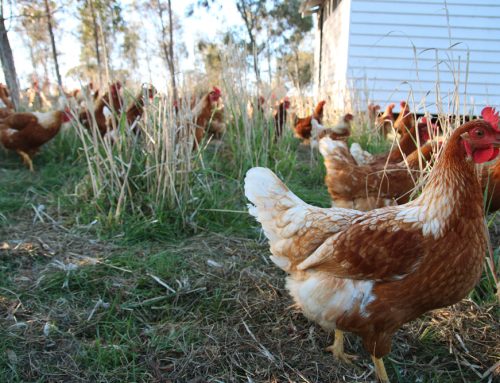Story by Tammi Jonas, 3 June 2014 (story first appeared on Tammi Jonas: Food Ethics)
The debate is raging once again around animal welfare activists trespassing on private property to obtain footage of conditions in intensive livestock farming. The activists’ stated aim is to expose what they believe are unconscionable practices in the rearing of animals. It seems the debate recently was re-ignited by a column by a celebrity personal trainer.
A number of farmers have reacted with concerns about biosecurity on their farms and risks to their entire herd from disease and distress, as well as dismay at invasions of their privacy, and some have expressed support for so-called ‘ag-gag laws’ as introduced in the US. These laws make it illegal to film or photograph practices on farms without permission from the owner. There’s also been a mildly amusing open letter from ‘Bill the Farmer’ to the celebrity above asking her to live under constant video surveillance.
[pull_quote align=”right”]But ask a recently arrived asylum seeker from Afghanistan if they think animal welfare activists are terrorists and I suspect you might gain a little healthy perspective.[/pull_quote] The hyperbole around factory farming and ag-gag laws includes allegations of activists as ‘terrorists’, factory farms as places of ‘horror’, and vegan ‘secret agendas’.Calling people who trespass to film animals in cages ‘terrorists’ is rather puerile and misinformed. Call them trespassers – because they are. Call them activists – because they are. Hell, call them criminals – because for those found guilty of said alleged trespass, they are.
Some terms I’d like to use
Inflammatory rhetoric aside, I’d like to consider what’s at stake in this debate. I’ll start by setting out some terms I’d like to use.
Intensive Farming
I usually steer away from the phrase ‘factory farming’ as I know it gets most intensive growers’ hackles up. To be clear, I don’t avoid it because I think it’s wrong (raising hundreds or thousands of animals in sheds in an industrial model is, in my view, rather accurately referred to as factory farming). But I want everyone in the discussion to be able to listen, so I try to avoid red flag phrases. I therefore use ‘intensive farming’ (and for the record, free-range farming is known as ‘extensive’).
Animal welfare activists
I won’t refer to ‘animal rights activists’, instead I’ll use ‘animal welfare activists’, because the movement is a broad church, and not all people who believe it’s immoral to cage animals share the view that non-human animals have rights as such. I also know intensive farmers who consider themselves animal welfare activists. I’m a free-range pig farmer, and I’ve considered myself an animal welfare activist since I was 19, but a vegan abolitionist would say I am in fact a murderer. And yet I would say we’re both animal welfare activists.
Ag-gag laws
I will use the label ‘ag-gag laws’, as I think they’re well understood now, and we don’t have a common alternative of which I’m aware. I appreciate that those who support these laws may take umbrage at the phrase, and ask that you bear with me.
As I see it, there are a number of stakeholders in this debate. There are the animals in intensive systems. There is the soil and water on and around the farms. There are the people who work on these farms, including those who own the farms. There are the families of the owners – I’m thinking particularly about the family farms where they live somewhere on the property. And then there is the local community, and the broader community of people (from vegan to omnivore) who have differing levels of concern about the ways animals are raised on farms, whether they eat meat or not.
Of course there are property rights, and trespass is illegal in Australia. So we already have a law that prohibits entering another’s property without permission to obtain footage of their practices.
Vegan abolitionist
I accept and share the concern about fear and feelings of violation at someone trespassing on your property with an intent that is contrary to your interest. Anyone who has had their home broken into knows the feelings of vulnerability that arise after a burglary or theft. If a vegan abolitionist entered our farm without our knowledge to film our pigs, I would be worried about their other possible motives, whether my children were out on the paddocks by themselves at the time, and whether they took anything except images away with them.
Radical transparency
But they have no need to do that on our farm, because we practice radical transparency. We have documented and outlined on national radio all of our farm management practices in great detail. And we invite the public in regularly – in fact people are welcome any day of the weekthat we’re here (which is most).
[pull_quote align=”right”]I reflect on how we really just need to move the pigs, not stop the visitor taking a photo.[/pull_quote]You’re welcome to photograph or film anything you see while you’re here, and when I find myself thinking, ‘oh, I hope they don’t take a photo of that mud patch where the pigs have turned the soil completely because we’ve been a bit slow in rotating them to another area,’What we need are not more laws that will stop people trying to expose what they believe is an injustice. We already have laws to protect your right to property and privacy.
Ag-gag laws must surely re-affirm the public’s concern that farmers have something to hide. Instead we should do as Australia Pork Limited (APL) did last year when footage was secretly filmed of an intensive piggery in NSW – APL got footage of the same piggery in daytime and stood by it.
I personally was still unhappy with what I saw, and so continue not to buy nor eat intensively-raised pork.
Bangalow Sweet Pork is another example of an intensive pig farm that has been prepared to be transparent about their farming practices. In 2009, they opened the doors for a Super Butcher video, and showed everything from their farrowing stalls to the group housing for growers. Again, seeing all those pigs confined in that fashion doesn’t sit well in my ethical code, but the information is there to empower the public to make ethical decisions.
The court of public opinion is real, and whether we like it or not, largely determines what is and is not acceptable. It’s a blunt jury, often led by a vocal minority, and yet when the minority exposes practices to the majority in a compelling way, the majority start to demand change.
[pull_quote align=”right”]How I would love to see ‘caged pork’ written on labels!.[/pull_quote]Look at the growth of free-range eggs in Australia. Whatever issues there may be with the certification systems (and they are many), we didn’t have free-range eggs just 20 years ago unless you were a farmer or one of the rare suburbanites with chooks in your backyard. That movement has grown enormously, and we even have ‘caged eggs’ labeled as such.It is surely in nobody’s interest to criminalise those intent on exposing injustice, rather than welcoming greater scrutiny of industrial agriculture’s impact on animals?
The more farmers practice radical transparency, the more the public will trust us, and the more we will continue to improve our practices. And if we’re transparent about our practices, we can combat the invisibility and lower animal welfare standards of imported pork smallgoods in Australia (70% of the total).
Radical transparency is a powerful motivator to do your best, and I for one welcome it.



